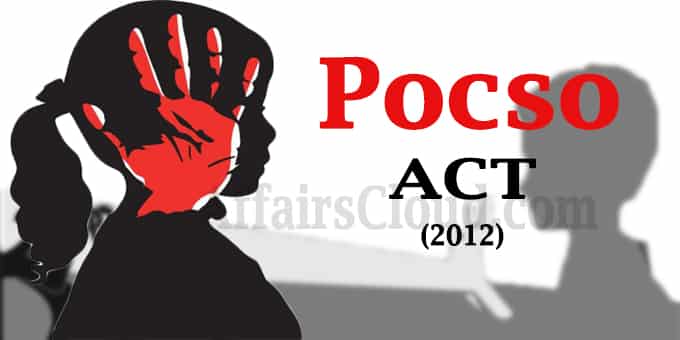On March13, 2020, In exercise of the powers conferred by section 45 of the POCSO Act, 2012, the Ministry of Women and Child Development (WCD), Government of India (GoI), has notified the new Protection of Children from Sexual Offences (POCSO) Rules, 2020 by replacing the earlier 2012 rules. The new rule will able to implement the recent amendments to this law, under which the provisions of punishment for sexual exploitation of children have been further made stringent. The new POCSO rules became effective from March 9, 2020. Key Points:
Key Points:
i.The new rules:
- Awareness generation and capacity building: It include mandatory police verification of staffs in schools and care centers, procedures for reporting sexually abusive material (pornography), provision of child rights education at the appropriate age among others.
- In addition, the state Government’s have also been asked to provide information about child helpline services through toll free number 1098.
- Compensation: It mandates the provision for compensation to the victim child, in which the State Government will pay the compensation to the victim as per the order by the Special Court within 30 days of receipt of such order.
- Reporting of pornographic material involving a child: Under the rule, any person who has get any pornographic material involving a child or any information regarding such pornographic material being stored, distributed or displayed, should report the contents to the special juvenile police unit (SJPU) or police official, or as the case may be, cyber-crime portal (cybercrime.gov.in) and upon such record of report, the SJPU or police take corrective action as per the directions of the Government issued from time to time.
- Medical aid and care: As per this rule, where an SJPU / police officer receives information about the offence committed, and is satisfied with the child against whom an offence has been done, should need to provide emergency medical care and protection to the child & take them to the nearest hospital or medical care facility center within 24 hours of receiving such information.
- Mandate: Under these rules, state governments have been asked to enact a child protection policy based on the principle of not tolerating violence against children at all, which must be implemented by all institutions, organizations or other agencies working in relation to children.
- The Central & State Governments have been asked to prepare age-wise educational material and curriculum for children in which children are given information about various aspects of personal safety.
- Interpreters, translators, special educators, experts & support persons: As per the rule, the District Child Protection Unit (DCPU) should maintain a register with names, addresses and other contact details of interpreters, translators, experts, special educators and support persons in each district & register will be available to the SJPU, local police, magistrate or Special Court(SC), as and when needed.
- Procedure for imposition of fine and payment: The CWC( Child Welfare Committee) along with the DLSA (District Legal Services Authority) mandated to check any amount of fine imposed by the Special Court under the Act which is to be paid to the child victim.
- Monitoring of implementation of the Act: The National Commission for the Protection of Child Rights (NCPCR) or the State Commission for the Protection of Child Rights (SCPCR) should monitor the designation of Special Courts by State Governments & appointment of the Special Public Prosecutors by the State Governments and other functions stipulated by the rule.
About POCSO Act, 2012:
It was enacted in 2012 to Protect the Children from Offences of Sexual Assault, Sexual harassment and pornography with due regard for safeguarding the interest and well-being of children.
In this Act, ‘child’ is defined as a person under 18 years of age and giving every stage more importance to ensure the physical, emotional, intellectual and social development of the child’s best interests and welfare.
A feature of the Act is that it does not include gender discrimination.
About Ministry of Women and Child Development (MWCD):
Headquarters– New Delhi
Union Minister– Smriti Zubin Irani





